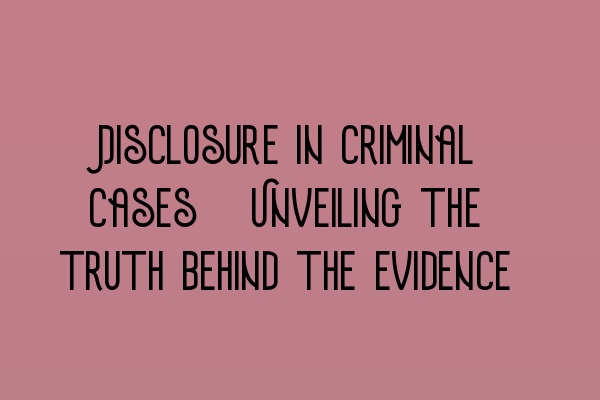Disclosure in Criminal Cases: Unveiling the Truth Behind the Evidence
When it comes to criminal cases, one of the fundamental pillars of justice is the concept of disclosure. Disclosure refers to the sharing of evidence between the prosecution and the defense, ensuring a fair trial where both sides have access to all relevant information. In this blog post, we will explore the importance of disclosure in criminal cases and how it can impact the outcome of a trial.
Before diving into the details, it’s important to note that disclosure goes hand in hand with the principles of fairness and transparency in the criminal justice system. By allowing both the prosecution and the defense to examine the evidence, the truth can be unveiled, enabling a fair and just outcome for all parties involved.
The Role of the Prosecution
In criminal cases, the prosecution has a duty to disclose all relevant evidence to the defense. This includes not only evidence that supports their case but also evidence that may undermine it. The prosecution’s role is to seek justice, not merely secure a conviction. Therefore, it is crucial that they present all available evidence to the defense, even if it weakens their case.
To ensure the integrity of the legal process, the prosecution must conduct a thorough investigation and actively seek out all relevant evidence. Failure to do so not only compromises the rights of the accused but also undermines the legitimacy of the criminal justice system as a whole.
The Importance of Defense Representation
On the other side of the courtroom, defense representation plays a critical role in ensuring a fair trial. Defense lawyers have the responsibility to examine the evidence presented by the prosecution, identify any weaknesses or inconsistencies, and advocate for their client’s best interests.
Effective defense representation relies on access to all relevant evidence. Without complete disclosure, the defense is at a disadvantage, unable to effectively challenge the prosecution’s case or present alternative theories. This can lead to unjust outcomes and potential miscarriages of justice.
Therefore, defense lawyers must be vigilant in their pursuit of full disclosure. They should carefully review the evidence provided by the prosecution, scrutinize the validity and reliability of witnesses’ statements, and explore any potential inconsistencies or omissions.
Disclosure Challenges and Solutions
While the need for full disclosure is widely recognized, challenges often arise in practice. The sheer volume of evidence, the complexity of modern investigations, and issues surrounding witness credibility can complicate the disclosure process. These challenges can result in delays, confusion, and even potential breaches of the accused’s right to a fair trial.
To address these challenges, technological advancements have played a vital role. Digital platforms and electronic databases have made it easier to organize and share large volumes of evidence. However, it is crucial to ensure that such systems are secure and accessible to all parties involved.
Moreover, ongoing training and awareness among legal professionals are key to promoting effective disclosure practices. By staying up to date with the latest developments and guidelines, lawyers can better navigate the complexities of the disclosure process, minimizing the risk of errors or oversights.
The Impact on Criminal Trials
The quality of disclosure can significantly impact the outcome of criminal trials. Insufficient or delayed disclosure can hamper the defense’s ability to effectively challenge the prosecution’s case, leading to wrongful convictions or compromised verdicts.
On the other hand, robust disclosure practices contribute to a fairer legal process. They enable a more comprehensive examination of the evidence, allowing for informed decisions to be made by judges or juries. This promotes trust in the criminal justice system and upholds the principles of justice and equality before the law.
Conclusion
Disclosure plays a vital role in ensuring fair and just criminal trials. It allows for the truth behind the evidence to be unveiled, and all parties involved to have access to relevant information.
As legal professionals, it is our duty to uphold the principles of disclosure, conducting thorough investigations, and ensuring timely and complete sharing of evidence. By doing so, we contribute to a more transparent, equitable, and reliable criminal justice system.
If you’re interested in further exploring topics related to criminal law, practice exams, or preparation courses for the SQE exams, we encourage you to check out the following articles:
- SQE 1 Practice Exam Questions
- SQE 1 Practice Mocks FLK1 FLK2
- SQE 2 Preparation Courses
- SQE 1 Preparation Courses
- SRA SQE Exam Dates
Feel free to click on the links above to gain more insight into the SQE exams and find resources to help you succeed in your legal career.
